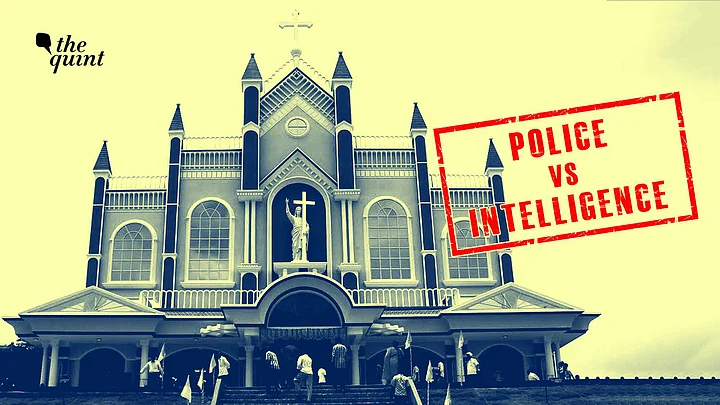In Karnataka, where the Bharatiya Janata Party government is planning to introduce an 'anti-conversion' bill in the Legislative Assembly, the state intelligence wing and the police department have two distinctly dissimilar takes on 'unauthorised' churches, The Quint has gathered.
While the intelligence wing, which comes under Karnataka Chief Minister Basavaraj Bommai, is in the process of gathering intel on 'unauthorised' churches, the police department, which comes under Home Minister Araga Jnanendra, has already concluded that there are no 'unauthorised' churches within any of the district jurisdictions.
Twin Takes on Churches
The Quint had reported on 23 October that Additional Director General of Police, Intelligence had issued an order on 16 October asking intelligence officers to round up information on all 'authorised' and 'unauthorised' churches functioning in government and private properties including homes.
According to a source, the state intelligence has narrowed in on 236 such 'illegal' Christian places of worship, from across the state. However, when this reporter contacted top police officers of all 31 districts in Karnataka, they concurred that there are 'no illegal churches' within their jurisdictions.
"The intelligence could be doing the exercise of finding such institutions, but from the police's side, we have not got any information regarding 'unauthorised' churches anywhere," a top police officer in Bengaluru told The Quint.
Interestingly, even the police officials of Dharwad and Mangaluru districts, where Hindu right-wing outfits including the Bajrang Dal and Vishwa Hindu Parishad had protested against 'forced conversions' and 'proliferation of churches', denied the existence of any such illegal activities. In Dharwad district's Hubli, a group of people affiliated to the Bajrang Dal had allegedly sung bhajans at a church.
"We have had no illegal religious structures within our jurisdiction. In the entire district, there are no illegal religious activities," a senior police official from Dharwad said.
In Mangaluru, a police official said, "We have no information about any illegal religious activity. We are sure that there is no such activity in Mangaluru."
In the state's capital Bengaluru, the police have no information regarding unauthorised churches in either rural or urban jurisdictions, two police officials in the know said.
Meanwhile, in Chief Minister Bommai's home district Haveri, a police official said, "We do not encourage communally sensitive misinformation. We have not come across any illegal religious conversion or structures."
In other districts, senior police officials were more candid in their denial. A police officer of Yadgiri district asked, "What is an unauthorised church? There are institutions which are 70 and 80 years old in the district. We don't have any unauthorised or illegal activities here."
Some of the police officials heading law and order duties in districts, whom this reporter contacted, denied the existence of 'forced religious conversions' within their jurisdictions, too.
In Mysuru, Mandya and Chamarajnagar districts, police officials said they had never heard of illegal religious conversion till recently.
"I am not sure what information is driving the theory that there are illegal churches. We have no such information," a police officer from Mandya said.
An officer of Chamarajnagar said, "We do not interfere with the functioning of religious places unless there is a law and order problem. There is no such problem in the district."
The contradictory inputs from the police and intelligence departments on churches have come at a time when the state government has been claiming that a legislative committee on minorities and backward classes has been conducting a 'survey' of churches. This, even as right-wing outfits, have been clamouring for an anti-conversion act to prevent 'religious conversions'.
What do these different takes by the intelligence and police departments ultimately mean?
Who Will Decide the Fate of Churches in Karnataka?
The Karnataka police seems to be clear that they will not act on any religious places of worship without complaints. "We know our job. We are not going to look into any 'unauthorised' church," the top police officer based in Bengaluru official said.
Meaning, the matter is left to the intelligence wing alone.
"Each of the officials who were copied in the internal communication issued on 16 October were intelligence officials. Intelligence inputs come under the purview of the Chief Minister directly," the officer said.
Is the Chief Minister, who had announced earlier that the state plans to moot a stringent 'anti-conversion' law, finding ways to legitimise the need for such a law?
A bureaucrat, who is familiar with the working of intelligence and police departments, said, "If the intelligence gathered suggests that there are 'unauthorised' churches, then a second opinion will not be sought from the police. This means that even if there are no criminal cases pertaining to 'unauthorised' churches, government can bring in legislation to curb religious conversion in such 'unauthorised' churches."
What about the church survey reportedly undertaken by the legislative committee? A civil servant said, "The committee has no authority to take up such a survey in the first place. But if they go ahead with the survey, the inputs they get from any of their sources can be tabled in the Legislative Assembly, paving the way for a legislation that curbs certain religious activities."
Even as the fate of churches in Karnataka seems to be stuck in a game of musical chairs between the police department, the intelligence wing and a legislative committee, Christian church authorities have been saying that they will "cooperate with the government".
Some religious heads, including the Archbishop of Bengaluru, have opposed the church survey and the anti-conversion legislation.
(At The Quint, we question everything. Play an active role in shaping our journalism by becoming a member today.)
